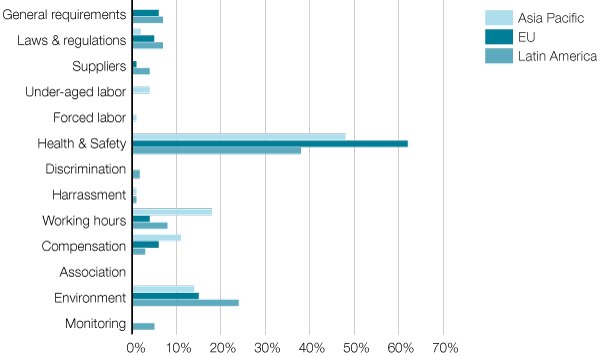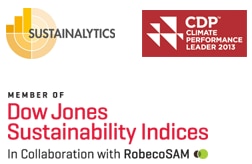HUMAN RIGHTS
MANAGEMENT APPROACH
Protecting the rights and dignity of every individual is becoming increasingly important to business operations. For Electrolux the Code of Conduct is the key tool to address these issues.
For Electrolux, the most significant issues relating to human rights include providing a safe working environment where workers are free from harassment or discrimination, providing fair working conditions for employees and respecting freedom of association.
Work with the Code of Conduct (CoC) guides efforts to assess, manage and mitigate risks of non-compliance in operations and help define expectations within the Group’s sphere of influence. With a revised CoC to be rolled out in 2014, Electrolux is aligning expectations to new and emerging sustainability issues, including increased focus on human rights.
Achievements and objectives
For 2013 achievements and future objectives in regards to areas relating to human rights, see the performance reviews for People and Operations (Ethical business) and Stakeholders and Society (Responsible sourcing).
Codes and policies
Relevant codes include the Electrolux Code of Ethics and the Code of Conduct, supported by the Workplace Standard, which includes mandatory practices to ensure compliance. The CoC and Workplace Standard apply in equal measure to own operations and along the supply chain, as described in Management approach: Labor practices.
Protect, respect and remedy
The Group’s approach to human rights due diligence builds on existing processes including CoC audits, the ALFA assessment, supply chain audits and evaluations, remediating action plans, and stakeholder dialog. Additionally, grievance mechanisms in the form of the Ethics Helpline, joint management-worker committees and collective bargaining processes are in place.
Each line manager has responsibility for active implementation of the CoC. Internal training and awareness is outlined in Management approach: Labor practices.
Processes are most effective if they are backed by a strong understanding how these issues are evolving. That’s why engagement in networks such as the Swedish Network on Business and Human Rights, and the UNICEF Corporate network for Children’s rights are important platforms to deepen knowledge needed for developing human rights due diligence.
Investment and procurement practices
Group Purchasing is ultimately responsible for compliance to provisions in the CoC along the supply chain. As an integrated part of the procurement process, purchasing teams ensure that high labor, human rights and environmental standards are mandatory and non-negotiable parts of evaluating potential and existing suppliers. This management approach ensures that quality and cost are achieved, but not at the expense of Group standards.
To support monitoring and training, the Responsible Sourcing Program provides global and local purchasers and suppliers with training, audits and development activities in Latin America, Europe, Middle East and Africa as well as Asia/Pacific. The director of the program reports to Vice President, Sustainability Affairs.
The objective of the Responsible Sourcing Program is fivefold:
- Ensure minimum performance and create long-term, sustainable improvement among suppliers as outlined in the CoC and Workplace Standard.
- Assure compliance to customers’ standards.
- Reduce risks to the Electrolux brand and reputation.
- Reduce the risk of serious non-compliances that could lead to disruption in product deliveries.
- Require direct suppliers to implement a systematic approach to CoC work, including expectations to drive improvements further up the supply chain.
Responsible Sourcing assessment criteria and the audit protocol were tightened this year, together with redefined performance indicators to improve internal feedback on supplier performance, increase speed of supplier improvement and measure the reach of our supplier training.
Audited suppliers are ranked on performance, and categorized according to findings: disqualified (zero tolerance findings), conditional (critical findings), active (acceptable number of findings) and preferred suppliers (only minor findings).
Based on the 376 audits performed, zero tolerance non-compliances were discovered in 37 cases and these were graded as ‘disqualified’. Such non-compliances must be remedied immediately for the business relationship to continue. Three audits were not completed. Group senior purchasing management is called upon to help ensure compliance. In total, 305 (81%) audits were graded as ‘conditional’; serious findings were identified that require re-audits. In 8% of the audits, requirements were met on most counts, earning the suppliers “active” status. Only in three audits (less than 1%) Group requirements were entirely met. They were thereby rewarded with “preferred” status.
Responsible sourcing audit findings

CoC auditors focus on monitoring performance and compliance for first-tier suppliers classified as high- or medium-risk through country risk mapping, and on particular activities deemed prone to risk. Snapshot.
Human rights considerations are also taken into account when Electrolux acquires and integrates new companies into the company fold.
Non-discrimination
As outlined in the Code of Ethics and CoC, Electrolux does not discriminate based on personal characteristics or beliefs such as age, race, ethnic group, religion, gender, political opinion, marital status, maternal/ paternal status or national or social origin. All Group and supplier employees are to be treated strictly according to his or her abilities and qualifications in any employment decision.
Moreover, Electrolux does not tolerate harassment in any form. This includes physical, sexual, psychological or verbal harassment or abuse, which take the form of written and verbal remarks, or offensive language and bullying. Neither does Electrolux tolerate behavior in which people in authority abuse their position through insulting, intimidating or malicious conduct.
All of these provisions are monitored in CoC audits, employee engagement surveys and through ALFA assessments and potential misconduct can be reported via the Ethics Helpline.
Abolition of under-age labor
Under-age labor is still common in some parts of the world, particularly in developing countries with high rates of poverty and low law-enforcement levels. As a zero tolerance issue, Electrolux strictly prohibits the use of child labor and requires suppliers to commit to these same standards.
Unless local law stipulates a higher age limit, no person younger than the age for completing compulsory education, or younger than 15 is employed by Electrolux. The company adheres to accepted international laws and practices as set out by the UNDHR and the UN Global Compact.
As in accordance with the ILO Minimum Age Convention, suppliers and local management are responsible for providing working conditions, working hours and wages that are appropriate for the authorized minors’ age. They must also be in compliance with applicable local law as a minimum.
Prevention of forced and compulsory labor
In accordance with the ILO Convention on the abolition of forced labor, forced or involuntary labor is not tolerated in any form.
During CoC audits, Electrolux makes sure that employees are covered by an employment contract, and workers are interviewed and documentation reviewed regarding their working conditions. In part, this serves to ensure that they work of free will, that their ID cards or passports are not withheld by their employers, that they are free to leave the site and that no loans or deposits exist between employer and employee that could potentially be a barrier for them to leave their employment.
Security practices
Stipulated in the Workplace Standard, the purpose of security guards is to ensure the safety of employees and protect the premises, not to stop employees from leaving the workplace.
StopSearchHereCEO Statement

In 2013 we continued to deliver above our growth target and delivered 4.5% in organic sales growth.
CEO Statement

I'm convinced that raising product efficiency for the growing middle class is where long-term shareholder value creation lies.
Our products

Electrolux is the only appliance manufacturer in the industry to offer complete solutions for both consumers and professionals. The focus is on innovative and energy-efficient products in the premium segments.
Sustainability
Achieving the Group's vision of sustainability leadership is crucial to realizing the business strategy. The objective is to develop smarter, more accessible, resource-efficient solutions that meet people's needs and improve their lives. Read the comprehensive sustainability performance review.
Awards & recognition

Financial Reporting
Net sales for the Electrolux Group in 2013 amounted to SEK 109,151m, as against SEK 109,994m in the previous year. The organic sales growth was 4.5%, while currencies had an impact of -5.3%.
